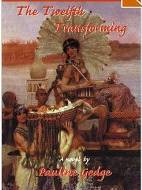People who know very little about ancient Egypt are most likely, if they know anything at all, to have at least a vague idea about the Pharaoh Akhenaten and be able to recognize the face of his beautiful wife, Nefertiti. Akhenaten’s allegedly monotheistic worship of Aten and the more naturalistic art produced during his reign, a revolutionary break from the more formal art of earlier periods, have made him a sympathetic figure to many. One extremely dubious but once-popular theory, advanced by Freud and others, ascribed the development of Judaism and later monotheistic religions to him. (It might be more accurate to describe that religion as Akhenaten’s worship of Aten, with the rest of Egypt still worshipping the Pharaoh.)
But to his own people, Akhenaten was a heretic who had overturned “Ma’at,” the underlying order and balance of the universe, and opened the world to chaos.
A number of novelists, among them Nobel laureate Naguib Mahfouz, Mika Waltari (whose first novel, The Egyptian, treated Akhenaten sympathetically and was a huge bestseller in the late 1940s), and even Allen Drury, author of Advise and Consent and other political novels (and one ponderous sf novel, The Throne of Saturn), have tried their hand at novels about this historical figure. When Pauline Gedge, a novelist who has made a specialty of novels set in ancient Egypt, turned to Akhenaten as a subject, I raced to the bookstore for my copy of The Twelfth Transforming.
Gedge seems especially well suited to writing about ancient Egypt. Her prose is lush and sensual, capturing the beauty and magnificence of Egypt’s artifacts, the timelessness of its landscape, and the oppressiveness of its hot climate. She manages to get inside the heads of her characters and create people who are both recognizably human and yet alien, part of a culture that, no matter how much you read about it or study it, seems to slip just beyond the grasp of being completely comprehensible. Ancient Egyptians went to great lengths to avoid change; they couldn’t entirely do so, of course, but did preserve a cultural continuity for almost four thousand years. Their lives depended on the annual inundation of the fertile land on either side of the Nile River; any disruption of the regular floods meant famine and starvation. Too many such environmental disasters could only mean that Pharaoh had failed at his duty of preserving order.
The story Gedge tells is a dark one, seen largely through the eyes of Tiye, mother of Akhenaten and a strong woman able to function as regent during the last years of her ailing husband, Amunhotep III. As the royal line of the Pharaohs was traced matrilineally, the ruler was required to cement his legitimacy by marrying a daughter of that line; in Gedge’s novel, Akhenaten goes even further, bedding his mother, his sister Sitamun (previously a royal wife of her father Amunhotep), and eventually three of his daughters and his brother Smenkhara. Gedge remains inside the heads of her characters while presenting this incestuous tale; she does not judge them, but also does not shrink from showing the emotional damage wrought on Akhenaten’s inner circle and the suffering his radical religion might have inflicted on his kingdom. Tiye, Akhenaten, and the other many other historical figures around them (including Horemheb, the general and usurper who saw his mission as restoring Ma’at), are recognizably humans driven by a need for political power, yet also remain people of a distant past; Gedge resists anachronisms and avoids judging her characters by our mores. Akhenaten is more truly alien, yet understandable, in her depiction than in any of the other novels I have read about this compelling historical figure.
Pamela Sargent’s Seed Seeker, third in a trilogy that includes Earthseed and Farseed, will be published by Tor in 2010. Her other books include the science fiction novels Venus of Dreams and The Shore of Women, the alternative history Climb the Wind, and Ruler of the Sky, a historical novel about Genghis Khan that Gary Jennings called “formidably researched and exquisitely written.” She lives, works, writes, and reads in Albany, New York.










